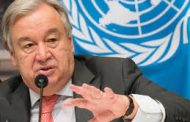Alex BroadbentStefan Swartling Peterson, the chief of health at Unicef, has a theory. “Covid now really scares us,” he says. “The difference, to me, is that … it can affect the people with power … the people who communicate, rather than the poor people who have always been dying.” Yet, given the apparent international consensus and the need to demonstrate strong leadership, leaders in the region may have little political alternative.However unenviable the predicament of African leaders, the continent’s residents are to be envied even less. Many face more severe and immediate threats to life, not least pneumonia, which is the mechanism by which Covid-19 kills.Lower respiratory tract infection, caused by a prior bacterial or viral disease, is the largest cause of death on the continent. Covid-19 might increase that risk, but it’s hardly something to write home about, and not preferable to the hunger caused by recession.Would we care about the increased risk of fatal pneumonia that Covid-19 might cause in Africa, if it did not also greatly increase the risk of fatal pneumonia for prime ministers, business people and university professors, including those in countries where infectious disease and its terrors are supposed to be of historical interest only?Do not be tempted to retort that Covid-19 will kill more people in total. By far the most dangerous disease in human history is malaria, preventable with mosquito nets. Almost nobody dies from childbirth in developed countries, and few children die of pneumonia. But in developing countries, according to Unicef, five million children die each year from pneumonia, malaria and childbirth complications.That adds up fast. We don’t care about Covid-19 because of how many it kills, but whom.Despite the strikingly different cost-benefit analysis for the African region, we’re doing the same thing here as everywhere else, or trying to: we’re locking down.And it doesn’t take much reflection to realise that we’re not really locking down, given how many people live in overcrowded accommodation where the nearest sanitation is a shared facility at considerable distance from your shack or in rural areas.Is there an alternative to lockdown? Yes: lock down areas where this makes sense, and which have the older portion of the population, but don’t lock down where it’s impossible to do so. Regional quarantine may be more effective in Africa, where conurbations are separated by large distances. The benefits of separating at-risk populations also deserve fuller consideration.In Africa, and other developing regions, older people in urban areas often move back to rural areas. In rural villages, it may be possible to separate older and younger people more easily than in a crowded township or slum, where lockdown is a nonsense.This is not my idea, but an idea suggested by the leaders of a village in a rural part of Africa. And this shows us the best idea of all — ask people to solve the problem for themselves. People who live in a community know their way of life.It’s time that African leaders, and especially those in South Africa, get themselves advisers who are awake to the differences between Africa and the places where lockdown was conceived, and who are willing and able to model the full consequences — not just death by Covid-19 — of a full range of measures.Professor Alex Broadbent is director of the Institute for the Future of Knowledge and professor of philosophy at the University of Johannesburg. He specialises in prediction, causal inference, and explanation. His books include Philosophy of Epidemiology and Philosophy of Medicine.
https://khartoum-today.net/
 Sudan army chief Al Burhan freezes bank accounts of paramilitary RSF
Sudan army chief Al Burhan freezes bank accounts of paramilitary RSF Sudan’s SAF & RSF sign agreement intended to lay groundwork for humanitarian assistance
Sudan’s SAF & RSF sign agreement intended to lay groundwork for humanitarian assistance SAF, RSF agree on extension truce for the sixth time
SAF, RSF agree on extension truce for the sixth time Army, RSF agree to extend truce for 72 hours
Army, RSF agree to extend truce for 72 hours Sudanese people fled to Egypt amid acut humanitarian crisis
Sudanese people fled to Egypt amid acut humanitarian crisis THE ELEPHANT IN THE ROOM
THE ELEPHANT IN THE ROOM Death toll from Sudan fighting tops 180 as clashes in Khartoum enter fourth day
Death toll from Sudan fighting tops 180 as clashes in Khartoum enter fourth day By the UN Secretary-General Op-ed on G20 – 8 billion
By the UN Secretary-General Op-ed on G20 – 8 billion A strong military key to maintaining world peace
A strong military key to maintaining world peace Beautiful China shows new chapter of ecological conservation
Beautiful China shows new chapter of ecological conservation
LOCKDOWN IS WRONG FOR AFRICA (2)
About the author
Related Articles
2020 All rights reserved khartoum-today.net 0124293222






